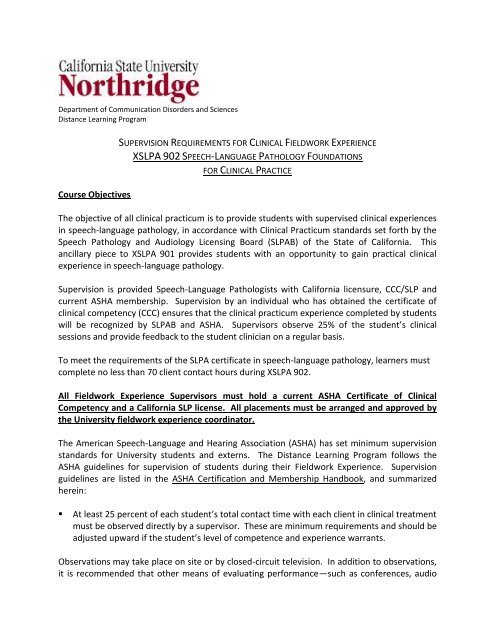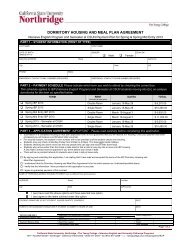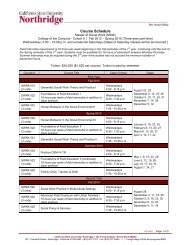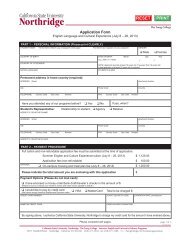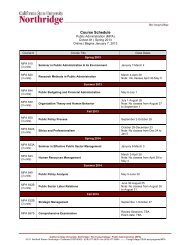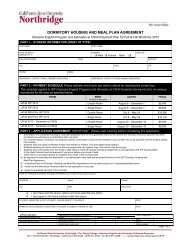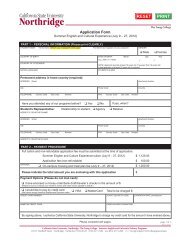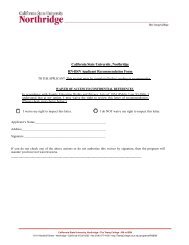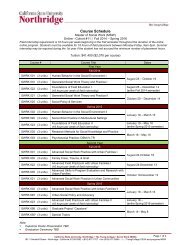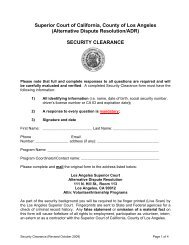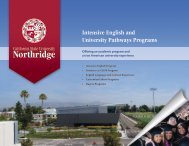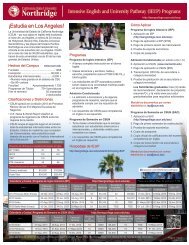this document - Tseng College - California State University, Northridge
this document - Tseng College - California State University, Northridge
this document - Tseng College - California State University, Northridge
Create successful ePaper yourself
Turn your PDF publications into a flip-book with our unique Google optimized e-Paper software.
Department of Communication Disorders and Sciences<br />
Distance Learning Program<br />
Course Objectives<br />
SUPERVISION REQUIREMENTS FOR CLINICAL FIELDWORK EXPERIENCE<br />
XSLPA 902 SPEECH-LANGUAGE PATHOLOGY FOUNDATIONS<br />
FOR CLINICAL PRACTICE<br />
The objective of all clinical practicum is to provide students with supervised clinical experiences<br />
in speech-language pathology, in accordance with Clinical Practicum standards set forth by the<br />
Speech Pathology and Audiology Licensing Board (SLPAB) of the <strong>State</strong> of <strong>California</strong>. This<br />
ancillary piece to XSLPA 901 provides students with an opportunity to gain practical clinical<br />
experience in speech-language pathology.<br />
Supervision is provided Speech-Language Pathologists with <strong>California</strong> licensure, CCC/SLP and<br />
current ASHA membership. Supervision by an individual who has obtained the certificate of<br />
clinical competency (CCC) ensures that the clinical practicum experience completed by students<br />
will be recognized by SLPAB and ASHA. Supervisors observe 25% of the student’s clinical<br />
sessions and provide feedback to the student clinician on a regular basis.<br />
To meet the requirements of the SLPA certificate in speech-language pathology, learners must<br />
complete no less than 70 client contact hours during XSLPA 902.<br />
All Fieldwork Experience Supervisors must hold a current ASHA Certificate of Clinical<br />
Competency and a <strong>California</strong> SLP license. All placements must be arranged and approved by<br />
the <strong>University</strong> fieldwork experience coordinator.<br />
The American Speech-Language and Hearing Association (ASHA) has set minimum supervision<br />
standards for <strong>University</strong> students and externs. The Distance Learning Program follows the<br />
ASHA guidelines for supervision of students during their Fieldwork Experience. Supervision<br />
guidelines are listed in the ASHA Certification and Membership Handbook, and summarized<br />
herein:<br />
• At least 25 percent of each student’s total contact time with each client in clinical treatment<br />
must be observed directly by a supervisor. These are minimum requirements and should be<br />
adjusted upward if the student’s level of competence and experience warrants.<br />
Observations may take place on site or by closed-circuit television. In addition to observations,<br />
it is recommended that other means of evaluating performance—such as conferences, audio
and video recordings, written evaluations, rating instruments, inspection of lesson plans and<br />
SOAP notes – be used in the supervisory process.<br />
In addition to the ASHA minimum standards, the Distance Learning Program also requires the<br />
following:<br />
• Be onsite 100% of the student’s clock hours<br />
• Attend weekly supervisory conference with the student<br />
• Read/edit the student’s paperwork and <strong>document</strong>ation<br />
a. Lesson Plans<br />
b. Daily Progress Notes (SOAP) Notes<br />
c. Screening Protocols<br />
• Complete student evaluations at 35 clock hours (midterm) and 70 clock hours (final) using<br />
the <strong>Northridge</strong> Evaluation Scale (NES)<br />
• Complete the Student Evaluation and Grade Recommendation form at the end of the<br />
clinical practicum experience<br />
• Complete the Supervisor Evaluation of CSUN Instructor at the end of the clinical practicum<br />
experience<br />
In general, fieldwork experience supervisors spend more time in supervision with students at<br />
the beginning of their fieldwork experience, and less time toward the end of the experience.<br />
Fieldwork supervisors should keep in mind that these are minimum guidelines; if a student<br />
should require significantly more than <strong>this</strong>, fieldwork experience supervisors are asked to notify<br />
the CSUN course instructor.
CLINICAL EDUCATOR'S ROLES AND RESPONSIBILITIES<br />
The clinical educator in a pediatric clinical practicum site has his/her primary responsibilities to<br />
the clients on the caseload. He/she has agreed to supervise a clinical practicum, but is not<br />
expected to teach basic academics. If a student needs to brush up on content areas, <strong>this</strong> must<br />
be done through outside reading and studying after work hours.<br />
The clinical educator is responsible for:<br />
1. Orientation to the educational facility's rules, including dress code, rules of<br />
confidentiality, procedures for handling patients, etc.<br />
2. Assignment of duties to the student.<br />
3. Adherence to ASHA's guideline for supervision of treatment hours.<br />
4. Guidance for establishing goals and implementing treatment plans for clients.<br />
5. Ongoing feedback and direction designed to facilitate professional and personal growth.<br />
Feedback can be delivered verbally and/or in written form, but should be constructive<br />
and frequent.<br />
6. Direction for <strong>document</strong>ation according to the procedures required at each individual<br />
site.<br />
7. Facilitation of the student's independence, through gradual decrease in dependence on<br />
the clinical educator for input. The student should be encouraged to problem solve and<br />
be increasingly self-reliant.<br />
8. Completion of a formal final evaluation, which will be supplied by the university. The<br />
information in the evaluation must be shared with the student and used to give<br />
constructive feedback. The evaluation should be emailed or faxed to the university. A<br />
midterm evaluation with the student is also required.<br />
9. Sign-off of clinical hours to be given to the student.<br />
10. Contacting the university concerning any difficulties during the clinical practicum<br />
experience.
Department of Communication Disorders and Sciences<br />
Distance Learning Program<br />
Fieldwork Experience Supervisor Expectations<br />
The primary role of the fieldwork experience supervisor is to assist the student clinician in the<br />
clinical application of knowledge and skills obtained in the academic program. This role takes<br />
the form of mentor, coach, and instructor.<br />
Fieldwork Experience Supervisors will:<br />
• Observe the students during sessions with clients at the clinical practicum site<br />
• Review all Weekly Lesson Plans; edit and approve all written work<br />
• Provide clear, unambiguous oral and written feedback<br />
• Consult with the student clinicians as necessary; or discuss strategies concerning<br />
implementing goals, treatment protocols, and techniques<br />
• Provide support and feedback as the student is developing his/her ability to plan, execute,<br />
and assess interventions<br />
• Clearly define any additional expectations related to specialty clinic needs<br />
In addition, fieldwork experience supervisors may demonstrate therapy techniques or<br />
participate in counseling sessions.<br />
Fieldwork experience supervisors will assess student performance at mid-term and at the end<br />
of the semester using the Evaluation of SLPA Student Extern, or equivalent. Fieldwork<br />
experience supervisors are expected to:<br />
• Meet with each student to review the midterm and final assessments, provide feedback,<br />
and discuss and agree upon action plans<br />
• Notify the course instructor if a student is having such difficulty that s/he may need<br />
additional support, or if there is a client safety concern<br />
• With the help of the course instructor, develop a clear, behaviorally-driven action plan for<br />
students not meeting the minimum requirements for passing<br />
• Provide student clinicians with appropriate feedback related to their behavior and dress<br />
within the clinical practicum setting<br />
• Provide feedback to the distance learning program if deficiencies in the student clinicians’<br />
knowledge and skills are identified.
Department of Communication Disorders and Sciences<br />
Distance Learning Program<br />
• Observe 25% of treatment sessions<br />
• Be onsite 100% of the student’s clock hours<br />
SUMMARY OF SUPERVISOR RESPONSIBILITIES<br />
• Attend weekly supervisory conferences with student<br />
• Read/edit student’s paper work<br />
Lesson Plans<br />
Daily Progress Notes (SOAP Notes)<br />
• Complete student midterm evaluation at 35 clock hours and final evaluation at 70 clock<br />
hours using the Evaluation of SLPA Student Extern form.*<br />
*Mail the final evaluation form to the course instructor, postmarked by the course due date<br />
Mailing Address:<br />
Department of Communication Disorders and Sciences<br />
Distance Learning Program<br />
<strong>California</strong> <strong>State</strong> <strong>University</strong>, <strong>Northridge</strong><br />
18111 Nordhoff Street<br />
<strong>Northridge</strong>, CA 91330-8279
COMMUNICATION DISORDERS AND SCIENCES DISTANCE LEARNING PROGRAM<br />
FIELDWORK EXPERIENCE IN SPEECH-LANGUAGE PATHOLOGY COURSE SYLLABUS<br />
XSLPA 902<br />
Instructors:<br />
Sherry Foldvary, MBA, MA, CCC-Sp<br />
Rosie Quezada, MA, CCC-Sp<br />
Offices:<br />
Address:<br />
Monterey Hall<br />
Department of Communication Disorders and Sciences<br />
18111 Nordhoff Street<br />
<strong>Northridge</strong>, CA 91330-8279<br />
Telephone: 818-677-2880, 818-677-2258<br />
Email: sherry.foldvary@csun.edu, rosie.quezada@csun.edu<br />
Course Meetings and Credit<br />
Course meets off campus, at assigned clinical practicum sites. Hours are arranged between campus and<br />
site supervisors. Students must provide their own transportation to and from their clinical practicum<br />
placements, and are responsible for maintaining their own automobile insurance coverage.<br />
Course Description<br />
XSLPA 902. CLINICAL PRACTICE IN SPEECH PATHOLOGY<br />
Prerequisites: CD 405, 410, 415, 442, and a bachelor’s degree in Communication Disorders/ Speech-<br />
Language Pathology. Supervised clinical experience in treatment for speech and hearing handicapped<br />
children, academic study of specific speech problems. 80 hours of clinical practicum experience.<br />
Course Objectives<br />
The objective of all clinical practica is to provide students with supervised clinical experiences in speechlanguage<br />
pathology, in accordance with Clinical Practicum standards set forth by the Speech Pathology<br />
and Audiology Licensing Board (SLPAB) of the <strong>State</strong> of <strong>California</strong>. This ancillary piece to XSLPA 901<br />
provides students with an opportunity to gain practical clinical experience in speech-language<br />
pathology.<br />
Supervision is provided Speech-Language Pathologists with <strong>California</strong> licensure, CCC/SLP and current<br />
ASHA membership. Supervision by an individual who has obtained the certificate of clinical competency<br />
(CCC) ensures that the clinical practicum experience completed by students will be recognized by SLPAB<br />
and ASHA. Supervisors observe 25% of the student’s clinical sessions and provide feedback to the<br />
student clinician on a regular basis.<br />
To meet the requirements of the SLPA certificate in speech-language pathology, learners must complete<br />
no less than 80 client contact hours during XSLPA 902.<br />
Knowledge and Skills Outcomes<br />
Students completing <strong>this</strong> course will be able to:
Apply their knowledge of the scope of responsibility, duties, and functions of speech-language pathology<br />
assistants in order to obtain a <strong>California</strong> SLPA license to provide clinical services in the following areas:<br />
• Conduct speech-language screening, without interpretation, and using screening protocols<br />
developed by the supervising speech-language pathologist.<br />
• Provide direct treatment assistance to patients or clients under the supervision of a speechlanguage<br />
pathologist.<br />
• Follow and implement <strong>document</strong>ed treatment plans or protocols developed by a supervising<br />
speech-language pathologist.<br />
• Document patient or client progress toward meeting established objectives, and report the<br />
information to a supervising speech-language pathologist.<br />
• Assist a speech-language pathologist during assessments, including, but not limited to, assisting with<br />
formal <strong>document</strong>ation, preparing materials, and performing clerical duties for a supervising speechlanguage<br />
pathologist.<br />
• When competent to do so, as determined by the supervising speech-language pathologist, act as an<br />
interpreter for non-English-speaking patients or clients and their family members.<br />
• Schedule activities and prepare charts, records, graphs, and data.<br />
• Perform checks and maintenance of equipment, including, but not limited to, augmentative<br />
communication devices.<br />
• Assist with speech-language pathology research projects, in-service training, and family or<br />
community education.<br />
Required Readings<br />
• Fieldwork Experience Manual<br />
• Reading assignments posted on Moodle<br />
• Other Readings may be assigned at the discretion of the course instructor<br />
Grading Policy<br />
All grades issued for clinics are letter grades. There are no plus (+) or minus (-) grades. Students will be<br />
issued a final grade at the end of the term that will become part of the student’s <strong>University</strong> academic<br />
record.<br />
The Evaluation for SLPA Student Extern is used by the fieldwork experience supervisor to assist in<br />
grading of students in clinical practica. Students will be provided with a copy of the evaluation form, for<br />
their information. Successful completion of all fieldwork experience is defined as earning a grade of “B”<br />
or better. Students who earn a grade of “C” or below in a fieldwork experience cannot automatically reenroll<br />
in the fieldwork experience course; students will be guided through a remediation process by the<br />
program’s advisory committee.<br />
Requests for an Incomplete (I) must conform to <strong>University</strong> policies. Among other requirements, an “I” is<br />
possible only for instances in which a student is demonstrating passing work in the class.<br />
Academic Honesty<br />
Every member of the academic community at <strong>California</strong> <strong>State</strong> <strong>University</strong> <strong>Northridge</strong> is expected to act<br />
with honesty and trustworthiness. In <strong>this</strong> course and all others, acts of cheating, plagiarism,<br />
misrepresentation, or other forms of dishonesty are not tolerated. Student academic dishonesty will<br />
result in penalties ranging from a failing grade on an assignment or examination, to a failing grade in the<br />
course, to referral to the Office of Student Affairs for determination of suspension or dismissal from the<br />
<strong>University</strong>, as described in the <strong>University</strong> Catalog.
In addition, students in the certificate program in Speech-Language Pathology must also conform to the<br />
ASHA Code of Ethics and Scope of Practice <strong>document</strong>s, as well as the <strong>State</strong> of <strong>California</strong> Speech<br />
Pathology and Audiology License Board regulations. (Please see www.asha.org and search “code of<br />
ethics” and/or the <strong>California</strong> Licensing Board website at:<br />
http://www.slpab.ca.gov/board_activity/laws_regs/index.shtml for more information on <strong>this</strong>).<br />
Attendance and Participation<br />
All students are expected to participate in all fieldwork experience assignments, course meetings, and<br />
the course discussion board site on Moodle. Students should report for their fieldwork experience each<br />
scheduled day, ready to work. In the event of an unforeseen circumstance such as an accident or an<br />
illness, the student is expected to notify the fieldwork experience supervisor AND the <strong>University</strong><br />
instructor as soon as possible.<br />
Students are HIGHLY recommended to treat <strong>this</strong> as a class, and to make any type of appointments at a<br />
day/time that does not conflict with the fieldwork experience. However, in the event that <strong>this</strong> is<br />
unavoidable, then the student must inform the fieldwork supervisor AND the <strong>University</strong> instructor prior<br />
to the scheduled absence.<br />
Failure to inform both instructors of your attendance, may directly affect your grade.<br />
Special Accommodations<br />
Requests for any special accommodations must be made to the instructor at the time of application for<br />
the fieldwork experience placement. The student’s qualifications for accommodation must be on file<br />
with the Student Disability Office before application is made.<br />
Service Objectives<br />
Students in XSLPA 902 will be providing speech-language services to the clientele of their assigned<br />
clinical practicum setting. In addition, students will be earning face to face clinical clock hours of<br />
experience as required by SLPAB and ASHA. Students will be supervised by licensed and certified<br />
professionals, as required by the university, by SLPAB and by ASHA. Students’ work will be monitored,<br />
and regular feedback will be provided to each student at least weekly during the course of the term.<br />
Course-Specific Expectations<br />
Students are responsible for arranging transportation to the fieldwork experience site at their own<br />
expense. Students will be expected to keep records of all client contact hours at the fieldwork<br />
experience site, adhere to the rules and policies of the fieldwork experience site, and meet all standards<br />
of practice as articulated under the state license law.<br />
Dress Code<br />
Students are expected to dress modestly and professionally during all clinical practicum sessions. Blue<br />
jeans, shorts, bare midriffs, low-cut blouses, and flip flops are forbidden. Clothes must be neat and<br />
clean. Students will demonstrate appropriate, inoffensive personal hygiene.<br />
Student Expectations<br />
Under the supervision of licensed, certified supervisors, student clinicians are expected to demonstrate<br />
their knowledge and skills in the treatment of clients with communication disorders. This includes, but<br />
is not limited to:
• Attendance and participation in all orientations, course discussion board, clinic sessions, and staffing<br />
meetings with fieldwork supervisors.<br />
• Review of the current status of the client’s communication disorder.<br />
• Use of appropriate clinical techniques.<br />
• Following and implementing <strong>document</strong>ed treatment plans or protocols developed by a supervising<br />
speech-language pathologist.<br />
• Development, selection, and effective utilization of materials for each clinic session.<br />
• Documenting patient or client progress toward meeting established objectives, and reporting the<br />
information to a supervising speech-language pathologist.<br />
• Assisting a speech-language pathologist during assessments, including, but not limited to, assisting<br />
with formal <strong>document</strong>ation, preparing materials, and performing clerical duties for a supervising<br />
speech-language pathologist.<br />
• Demonstration of professional interpersonal and oral communication skills throughout the semester<br />
and with SLP present, at parent/client conferencing.<br />
• Demonstration of self-evaluation skills, and acceptance of Supervisor feedback.<br />
• Accurate and up to date attendance logs.<br />
• Maintenance of accurate, legible, orderly, and neat clinical records.<br />
• Adherence for all <strong>University</strong>, program, and fieldwork experience site regulations regarding<br />
confidentiality<br />
Students are expected to turn in written assignments on time, in good condition, proofread, spell<br />
checked, and formatted according to the course specifications:<br />
• All <strong>document</strong>ation and communication about clients must be transmitted through the Moodle<br />
discussion board or message center sites. NO COMMUNICATION ABOUT CLIENTS CAN BE SENT<br />
THROUGH ANY OTHER EMAIL ACCOUNT OR SERVER.<br />
• All <strong>document</strong>ation will have the proper professional headings. Students are encouraged to refer to<br />
<strong>document</strong>ation samples.<br />
• All <strong>document</strong>ation will have signature blocks for the fieldwork supervisor.<br />
• All original <strong>document</strong>ation will remain in the client’s file at the fieldwork experience site<br />
• Weekly Lesson (Treatment) Plans are due at the beginning of each week or each session, at the<br />
supervisor’s discretion.<br />
• Daily Treatment Logs or Notes (SOAP format) are due at the end of each session.<br />
Students are expected to RESPECT their instructors and supervisors. They are expected to address their<br />
supervisors by title; accept feedback and evaluative comments in the spirit in which they are given, and<br />
to ask questions in a non-confrontational manner or challenging manner.<br />
Students are expected to respect the privacy of all clients and families:<br />
• Always make sure they are in a private area, and using a quiet voice when discussing any aspect of<br />
client care with the clinical practicum supervisor or site staff<br />
• Keep all client information hidden from view, and in approved viewing areas only<br />
• Respect the “Need to Know” provisions with respect to client information<br />
• Never remove any client files from the clinical practicum site<br />
• Never have food or drink around a client file<br />
• Never discuss clients outside of the context of the clinical practicum site or academic program
Students are expected to consult with supervisors immediately regarding any safety or client care<br />
concerns. Students can request a private consultation during the supervisor’s office hours.<br />
Students who are completing their fieldwork experience at their place of employment are reminded of<br />
the following:<br />
• You are seeing clients in your capacity as a Bachelor’s level speech language pathology assistant<br />
student extern, NOT as an employee of your school district.<br />
• Though your supervisor may be a fellow employee, he/she is NOT to be treated as a peer. He/she is<br />
your SUPERVISOR throughout the completion of <strong>this</strong> fieldwork experience, so accord the supervisor<br />
the appropriate level of respect when he/she provides you with feedback.<br />
• If a student has any concerns or difficulties with their supervisor, he/she is expected to contact the<br />
clinical instructors immediately either by phone or email so that the situation may be remedied<br />
when possible.<br />
Fieldwork Experience Supervisor Expectations<br />
The primary role of the fieldwork experience supervisor is to assist the student clinician in the clinical<br />
application of knowledge and skills obtained in the academic program. This role takes the form of<br />
mentor, coach, and instructor.<br />
Fieldwork Experience Supervisors will:<br />
• Observe the students during sessions with clients at the clinical practicum site<br />
• Review all Weekly Lesson Plans; edit and approve all written work. Lesson plans are due to you at<br />
the beginning of the week or before the treatment session at your preference.<br />
• Provide clear, unambiguous oral and written feedback<br />
• Consult with the student clinicians as necessary; or discuss strategies concerning implementing<br />
goals, treatment protocols, and techniques<br />
• Provide support and feedback as the student is developing his/her ability to plan, execute, and<br />
assess interventions<br />
• Clearly define any additional expectations related to specialty clinic needs<br />
In addition, fieldwork experience supervisors may demonstrate therapy techniques or participate in<br />
counseling sessions.<br />
Fieldwork experience supervisors will assess student performance at mid-term and at the end of the<br />
semester using the Evaluation of SLPA Student Extern, or equivalent. Fieldwork experience supervisors<br />
are expected to:<br />
• Meet with each student to review the midterm and final assessments, provide feedback, and discuss<br />
and agree upon action plans<br />
• Notify the course instructor if a student is having such difficulty that s/he may need additional<br />
support, or if there is a client safety concern<br />
• With the help of the course instructor, develop a clear, behaviorally-driven action plan for students<br />
not meeting the minimum requirements for passing<br />
• Provide student clinicians with appropriate feedback related to their behavior and dress within the<br />
clinical practicum setting<br />
• Provide feedback to the distance learning program if deficiencies in the student clinicians’<br />
knowledge and skills are identified.


